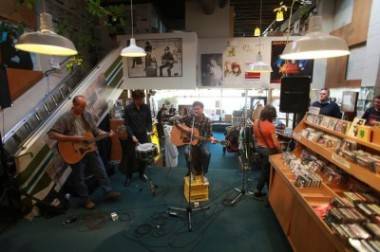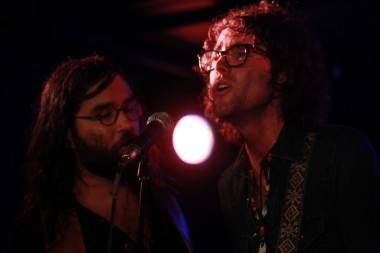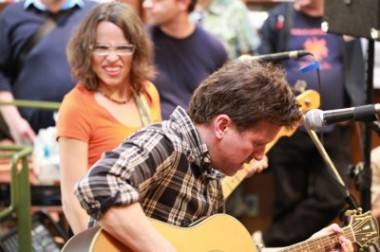Preview – Record Store Day Vancouver featuring at interview with Zulu Records’ Grant McDonagh
– by Erin Hanson
In 2008, a few American record store clerks wanted to remind us all to support our local record stores – businesses which support the community in numerous ways yet are constantly under threat of closing down. So, they established Record Store Day, to be held on the third Saturday of April. In a very short time it’s a day that has come to be celebrated by record stores, musicians, and music fans the world over.
It looks like every record store in the city is but it has an amazing front sign thanks to a local architectural sign company. Expect new arrivals and releases especially for Record Day, some major sales, giveaways, and lots of live music. For a listing of events across Vancouver, see below.
Despite this growing global appreciation for all things record store, people still give me weird glances when I walk down the street clutching newly pressed vinyl. We might love our record shops, but just how much have CDs, mp3s, and Soundcloud pulled us away? I was recently able to sit down with Grant McDonagh, the owner of Zulu Records, and ask him about Record Store Day, how iPhones are changing our shopping habits, and whether record stores still serve as as community centres for music nerds.
Video – Kurt Vile at Zulu Records
Erin Hanson: Record Store Day is coming up this Saturday [April 16]. What does that mean to you?
Grant McDonagh: I don’t know if I could capture it, but it’s really fun. That’s what it means. It’s a very busy day, the store is running fast, and it sort of captures the atmosphere of why record stores are important. When a record store is packed and there’s a real buzz it’s just sort of a great source of, an exchange of ideas.
I’ve always compared record stores to a library, or book stores. You know, you go to the library, and you might be overwhelmed by all the books, but the librarian will point you in the right direction and you can get an idea of what you’re looking for. And to be a librarian, you don’t just become a librarian. You go through years of training. So the librarians are essential to pointing people in the right direction, giving advice and so on, and frankly the good record store employees are kind of like librarians when it comes to music.
They can, not always, but we can somewhat whittle down what is good, what is recommended, what is a classic release. It’s just an exchange of ideas. You know, obviously with the Internet everybody can exchange ideas now, but for a record store, because we’ve been doing this for so long, it was a central meeting place where you could find out what was going on in the underground music scene and also the popular pop culture music scene.
It was just a place, a destination, the buzz. And so Record Store Day is kind of a reminder for some people in this day and age that a record store isn’t just a place that sells items. It’s sort of like a cultural meeting place… that’s a longwinded answer.
EH: I like that. That’s fantastic. It’s so true. It is sort of a cultural hub or a social hub for that.
GM: Right!
EH: So how are you celebrating record store day at Zulu?
GM: I’m working long hours personally [laughs]. No, we have two bands. We usually close at 6:30, but at that time we have two bands playing, No Gold and Yukon Blonde. And they’ll go on ‘til at least 8 p.m. And throughout the day we have, obviously, a sale.
It’s going to be 33 1/3 % off everything, which is an insane sale.Well, CDs and records, not magazines or tickets. But new or used CDs, records, 7-inch, 12-inch, whatever.That’s actually a really big sale, that’s almost like the biggest sale we’ve ever done. And it’s only for that one day of course, and it’s going to be packed. That’s 33 1/3 which is the RPM for a record, of course. People go “Why is it 33.3%?” Oh yeah, so we’re giving away tickets to some shows. We’re gonna rent a turntable and spin some tunes… We’re just gonna play music. Keep it simple.
EH: Did you think that Record Store day would actually take off the way it has?
GM: No, it caught me a little off guard, and I’m grateful that it did. I really am. We did it last year and the year before and thought, wow, this is good! So yeah, it’s great. It gets a bit of media attention, but it also, it’s a great reminder, you know. Like, we’re here the other 364 days a year, right?
EH: Absolutely. About the records themselves: does vinyl still sell well?
GM: Vinyl does okay. Vinyl can’t do everything and some people think vinyl’s saving the music business. Vinyl is a really great thing. It does sell well, it is certainly more consistent [than before]. The thing is that a lot of people intend to buy records but they actually don’t because they already have a listening device with songs on it. In the old days you had to go to a record store.
Whether it be us or anybody else, like A&B Sound, Sam’s [Sam the Record Man], or the other specialty stores like Track and Odyssey and whatever, but nowadays you don’t. So a lot of people are like, “Oh yeah, I’m going to go down to Zulu one day,” or Red Cat or Scratch or you know, Audiopile or something. I guess what I’m saying is that a lot of people want to have a lot of records but they already have enough music or else they have access to lots of music  so, I don’t know, the intent versus reality… I don’t want to sound too jaded here. We have some real die-hard customers.
EH: Tell me about the shift from vinyl to digital music.
GM: One of the things that changed most is the packaging. Like the fact is, there is such brilliant packing, be it a poster or a gatefold cover. They’re works of art. I won’t say it was exactly 50 per cent of the equation, but when you think of certain records, like a lot of people have thousands of songs on their personal device or on their computer, but you don’t get a visual image of the band. I mean, you might get a photo of the band in jeans and t-shirts, whereas when you think of the cover of the Beatles, Sergeant Pepper, the graphic comes to mind. Or Pink Floyd, Dark Side of the Moon.
Those are very extreme cases, but so many records at the time, until they stopped making records – when you think of almost any record from the ‘60s, ‘70s, or ‘80s, you can get an image for it. But in the nineties? The image is shrunken. [laughing] Now there is almost no image for a lot of bands. Well, there is, and there isn’t. You could say, people now just judge on whether it’s good or not, but it’s kind of sad that the graphics got lost in the shuffle. Not in every case, ‘cause we know there are bands that, some of the records we have are incredible. Their packaging, they do a great job.
EH: Has there been a resurgence in vinyl at all?
GM: Yeah, the resurgence happened a few years ago. The public is conscious of it now. Let’s say the low point for vinyl was in the early ‘90s. By the late ‘80s, the record companies, the majors in Canada pretty much stopped making them. By the early ‘90s, we whittled down our records to about three bins. Everybody wanted CDs and records weren’t even selling then. I’d say electronic music was the saviour for it. DJs kept vinyl alive. They don’t get the credit they deserve. It’s funny because it was the DJs who kept their records, other than people like older gentlemen who bought records and kept on with it.
Yeah, there’s always been records, but I would say percentage-wise when you ask about a resurgence – we’ve always sold records but I would say five years ago it was getting bigger.
EH: Has the social atmosphere of a record store changed as the musical formats have changed? Do people still come and hang out and chat about music? Or did that kind of change when mp3s came along?
GM: It has changed. People come into the store more informed. They’ve done better research at home, they’ve also got their iPhone in front of them, their Blackberry or whatever, so I would say that the customers are way more knowledgeable at what they want. Everybody knows what they like. The staff are still like the librarians, they’re still relied upon, so it’s kind of strange. I mean the atmosphere – it’s more of a weekend destination.
This is something that’s not written about a lot, but you could say what happened with the digitalizing of music 12 years ago or whenever, especially when iTunes started – the iPhone and all those personal devices absolutely changed shopping, period. People I don’t think shop as much anymore. A lot of people are just very focused: “I got this, thank you very much, goodbye.” And then they go from A to B to C to D. I think maybe there’s a little less strolling.
I think it’s a sign of the times. People get inundated with e-mails, with texts, phone calls. ‘Cause you know, everybody has a cell now, pretty much, almost everybody, and I think that’s really changed peoples’ patterns. So we do find that some customers don’t hang around as long. Yet some do. So you know, it’s a mixed bag. And it’s different age groups. And I love looking out and seeing people in their teens, 20s, 30s, 40s, 50s, 60s, whatever, I like seeing the crossover of people. I like seeing people with adventurous tastes. And sometimes customers help other customers, you know what I mean? We don’t even have to – other people help each other out, that’s kind of cool, I thought.
EH: Sharing music is a very good thing.
GM: Yeah. And that’s one thing too. Years ago people bought either dance music, or soul, or jazz. Nowadays people buy whatever. You see the different kinds of shoppers purchasing music by the same person, that you’ve never seen before. You know? That’s actually a sign of the times. So it’s hard to predict what people will buy sometimes. It’s harder than ever, I would say.
EH: Tell me about where your record store is heading now.
GM: The thing I like about Zulu – we made some business cards years ago. We never had a slogan, and we did a few cards with silly slogans, and ultimately, the card that we kept referring to was Zulu: Record Store and Community Centre. And it was kind of true. People could just hang at the store. Frankly, that was more accurate than I thought at the time, meaning, if anything, we got the order wrong. It should be Zulu Records: Community Centre and Record Store.
It is a business, but it is about a place to hang. So we had a lot of in-stores, we had a lot of artists perform there. We just try to make it casual. Whenever I get confused, I just think, we need to keep it simple. What can we do to make it more fun?
That’s the best way I can put it. And we’re very grateful for the store footage we have. The one thing Zulu has more than anybody is square footage. And you can do things with that square footage. Like when The xx played? There were hundreds of people there for that, it was incredible. And Billy Bragg, 250 people showed up. We’ve done some really good ones. So Saturday, we’re just going to have fun, and keep it casual. Come in, say hi, and have fun.




